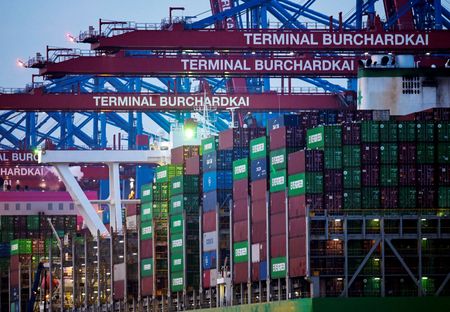By Philip Blenkinsop
BRUSSELS (Reuters) – The European Commission said on Friday it would react “firmly and immediately” against tariff increases resulting from U.S. President Donald Trump’s proposed “reciprocal” trade policy, which it labelled unjustified and a step in the wrong direction.
Trump has tasked his economics team with devising plans for tariffs on every country that imposes tariffs on U.S. imports or subjects U.S. companies to value-added or digital services taxes. Trump’s potential targets include China, Japan, South Korea and the European Union.
“The EU maintains some of the lowest tariffs in the world and sees no justification for increased U.S. tariffs on its exports,” said a statement from the Commission, which coordinates trade policy for the 27-nation European Union.
The EU executive said over 70% of imports enter the bloc tariff-free.
“The EU will react firmly and immediately against unjustified barriers to free and fair trade, including when tariffs are used to challenge legal and non-discriminatory policies,” the Commission said in a statement.
European countries stress that value-added taxes they charge on imported goods, though typically higher than in the United States, are not equivalent to tariffs since they apply equally to domestic producers.
A fact sheet from the White House on Thursday highlighted the difference between EU tariffs on car imports of 10% and the U.S. import duty of 2.5%, as well as EU restrictions on imports of U.S. shellfish.
It also criticised value-added tax, used across the bloc, as discriminatory and extraterritorial. And it took aim at regulatory requirements and digital services taxes on U.S. companies, such as in France which imposes a 3% tax on revenues from digital platforms and advertising, markets led by firms such as Google, Meta and Amazon.
The French finance ministry declined to comment on Trump’s attack on the tax, but Finance Minister Eric Lombard told Bloomberg TV earlier this week that it would not be changed because of tariff threats.
Senior EU lawmaker Bernd Lange, the head of the European Parliament’s trade committee, said the EU could negotiate on tariffs, but would not give up its right to regulate.
The Commission declined to comment on the scope of future negotiations, but did say contacts with the U.S. administration would ramp up in the coming weeks.
Commission President Ursula von der Leyen said unjustified tariffs would prompt “proportionate and decisive countermeasures”, echoing her vow on Tuesday of a “firm and proportionate” response to Trump’s decision to impose tariffs on all steel and aluminium imports.
EU ministers responsible for trade took a softer line on Wednesday by prioritising negotiations over retaliatory measures, aware that the U.S. steel and aluminium tariffs will only apply from March 12.
“There is a window for negotiation,” Irish Foreign Minister Simon Harris said in a statement.
Similarly, Trump’s memorandum on Thursday left the decision on new tariffs until after a series of reports due by April 1 on the U.S. goods trade deficit and practices of trading partners.
Three EU diplomats said it made sense to use the time to negotiate, while preparing a firm response if U.S. tariffs were imposed.
“Our response will be on the one hand calm and on the other maintaining unity,” one diplomat said. “The EU will not come with an offering on a tray and only then start negotiating. We are equal partners.”
(Reporting by Philip Blenkinsop, Jan Strupczewski, Benoit Van Overstraeten, Writing by Charlotte Van Campenhout, Editing by Alex Richardson, Sharon Singleton, Peter Graff)









